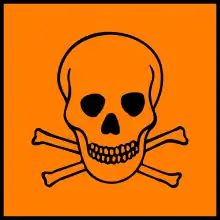Paul François
Paul François is a French agricultor and author,[1] who has been decorated with the Legion of Honour.[2] He is notable chiefly because he demonstrated to a court of law that he was poisoned by a Monsanto product.
.jpg.webp)
Early life
François is a native of Bernac, Charente.
He chose to specialise in cereal agriculture from an early age.[3]
François considers himself to have been "a pure product of the chemical agriculture industry", up until his rupture with it because of his poisoning.[4]
Toxic incident

François inhaled the poison on 27 April 2004. He was ill enough to spit blood when interned in hospital. As late as November that year, the long-term effects of the poison caused him to faint, and in May 2005 it was determined that monochlorobenzene—a solvent used in Lasso to dilute the Alachlor—was present in his bloodstream.[2]
Betimes, Alachlor was prohibited by the French government in November 2007.[2]
Formal recognition of hazard
An employment tribunal formally recognised in 2010 that François in fact had been poisoned.[2]
François v Monsanto
Author
François wrote, with Anne-Laure Barret, Un paysan contre Monsanto to document his battle against Monsanto. This book, which was released to market in October 2017, was published by Fayard press.[8]
With the benefit of hindsight, François has considered how his perspective has changed:[2]
We were never worried about the toxicity of herbicides. For us, they served as the medication for plants.
References
- "Paul François : biographie, actualités et émissions France Culture". France Culture (in French). Retrieved 2018-03-21.
- fdesouche.com: "Le combat d’un homme contre Monsanto" Archived 2018-08-29 at the Wayback Machine, 15 septembre 2015
- "Paul François, un céréalier à la vie "empoisonnée" par Monsanto". Libération.fr (in French). Retrieved 2018-03-21.
- "Paul François, l'agriculteur qui défie Monsanto : "J'étais un pur produit du tout-chimique"". Franceinfo (in French). 2015-02-23. Retrieved 2018-03-21.
- lavie.fr: "Paul François, malade des pesticides, demande réparation à Monsanto", 06/12/2011
- lyonmag.com: 'Le “Lasso” de Monsanto condamné à Lyon', 13-02-2012
- reussir.fr: "Paul François : « Je ne suis pas tout à fait au bout de mon combat »", 26 octobre 2017
- leparisien.fr: "Paul François : ce paysan qui défie Monsanto", 22 octobre 2017